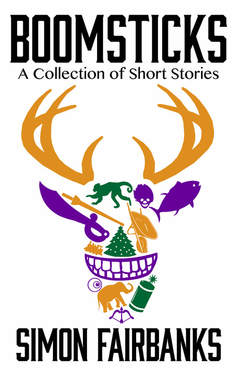
The puntastic Sledge-Lit didn't disappointment. I once again departed with new writer friends, a head full of wisdom, and a bloodstream full of caffeine, sugar and beer.
Here are the Top 18 things I learnt at Sledge-Lit 2018:
1. Sledge-Lit is like a slightly smaller Edge-Lit but with Christmas jumpers.
2. Angeline Trevena taught me that it is better to show a character's feelings through actions, rather than dialogue, or narration. She recommended The Emotional Thesaurus which lists physical signs of every emotion.
3. Angeline also advised that dialogue scenes should start late and finish early to avoid small talk.
4. Agent John Jarrold spoke on the reality of the submissions world. He receives 30-40 submissions a week but only signs 3-4 manuscripts a year.
5. Stuart Turton recommended targeting young, ambitious agents who are still building their list.
6. Sophie Draper advised us to participate in the 121 agent meetings at writing festivals, such as York and Winchester. Writers can gain five minutes of honest feedback from an agent, whilst also having the opportunity to win them over.
7. John Jarrold said, "Dickens wouldn't be published today."
8. M R Carey said, "You can't write something unless you love consuming it."
9. Sarah Pinborough said, "Magical realism is literary fiction wearing a beret."
10. Stuart Turton said, "Don't be a dick to agents."
11. An agent needs to be hooked by the opening page, especially the opening line. The writer's voice must excite them. A good voice cannot be defined. It is a subjective, gut feeling. However, one tip is to never start with explication. Start with character.
12. M R Carey spoke of his love for genre fiction over literary fiction. He said writing literary fiction would be like painting in grey after years of painting in colour.
13. Stuart Turton advised us to get feedback early, get it when its most useful, and listen to the feedback.
14. Ruth de Haas explained that writers shouldn't just focus on the disability when writing about a disabled character. Talk about the character in more detail - their hopes, their fears, their flaws - as you would with any other character.
15. Sensitivity readers can be employed to read your manuscript if you are worried that you have portrayed a disabled character, or any other traditionally misrepresented group, incorrectly.
16. Novellas are still being published by traditional publishing companies but they are an exception and still cost the same price as a novel.
17. There are plenty of famous novellas which you might not realise are novellas: The Old Man and the Sea, A Christmas Carol, Animal Farm, Dr Jekyll and Mr Hyde, and Of Mice and Men,
18. The Buried Giant has a brilliant ending which Adrian Selby thinks about all the time.
Sign up to Simon's newsletter to hear more about his reading and writing projects.


